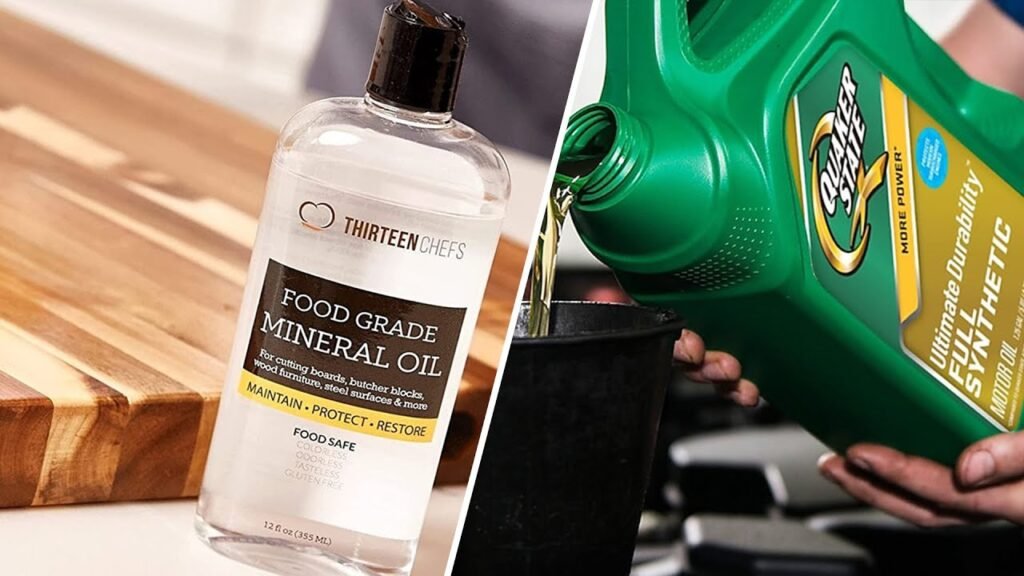Engines are the heart of any vehicle, and the oil inside them is what keeps everything running smoothly. Choosing between synthetic oil and mineral oil can be tricky, especially when both have passionate supporters. Having tried both over the years in different vehicles, the differences in performance, maintenance, and longevity become clear once the miles start adding up.
Understanding the Basics of Engine Oil
Before comparing the two, it’s important to understand what engine oil actually does. Beyond simply lubricating moving parts, oil cools components, prevents rust, reduces friction, and cleans internal surfaces by carrying away contaminants. The quality and type of oil play a huge role in how well an engine performs and how long it lasts.
What Is Mineral Oil?
Mineral oil, also known as conventional oil, is derived from refining crude petroleum. It’s the traditional choice for many older vehicles and is widely available at lower prices.
Advantages of Mineral Oil
- More affordable than synthetic oil.
- Readily available in most service stations.
- Works well for older engines that were designed for conventional lubrication.
Drawbacks of Mineral Oil
- Breaks down faster under high temperatures.
- Requires more frequent oil changes.
- Provides less protection in extreme driving conditions.
What Is Synthetic Oil?
Synthetic oil is engineered in laboratories using chemically modified petroleum components or entirely synthetic compounds. Its molecular structure is uniform, providing superior lubrication and protection.
Advantages of Synthetic Oil
- Maintains viscosity across a wide temperature range.
- Offers better protection against wear and tear.
- Resists sludge and deposits more effectively.
- Extends the interval between oil changes.
Drawbacks of Synthetic Oil
- Higher cost compared to mineral oil.
- Overkill for older engines with simpler lubrication needs.
Key Differences Between Synthetic and Mineral Oil
Switching between these oils reveals some clear contrasts in real-world driving.
Performance in Cold Weather
Mineral oil thickens noticeably in cold temperatures, making engine startups harder and slower to lubricate parts. Synthetic oil flows more freely in the cold, ensuring quicker protection during winter mornings.
Performance in Hot Conditions
Under high heat, mineral oil tends to thin out faster, reducing its protective qualities. Synthetic oil maintains stability, even during long drives in hot climates.
Engine Cleanliness
Mineral oil often leaves more deposits and sludge over time, especially if oil changes are delayed. Synthetic oil keeps internal components cleaner due to fewer impurities and better resistance to oxidation.
Oil Change Frequency
Mineral oil usually needs replacement every 3,000–5,000 miles. Synthetic oil can last up to 7,500–10,000 miles depending on driving habits and conditions.
When Mineral Oil Works Best
Mineral oil remains a strong option for:
- Older cars with high mileage that have always used conventional oil.
- Vehicles driven infrequently or for short distances.
- Owners looking for the most budget-friendly option.
When Synthetic Oil Outshines Mineral Oil
Synthetic oil proves its value in:
- Modern high-performance engines.
- Extreme temperature environments, both hot and cold.
- Drivers covering long distances regularly.
- Engines under heavy loads, such as towing or high-speed driving.
Mixing Synthetic and Mineral Oil – Is It Safe?
While both oils can technically be mixed, it dilutes the benefits of synthetic oil. Mixing may be unavoidable in emergencies, but sticking to one type for consistency is ideal for engine health.
Cost vs Long-Term Value
The higher upfront cost of synthetic oil can be offset by longer change intervals and improved engine longevity. Over the course of several years, the reduced wear and fewer oil changes can make it a cost-effective choice despite the initial expense.
Environmental Considerations
Synthetic oil tends to last longer, reducing the volume of waste oil produced. However, both types require proper disposal to prevent environmental harm. Recycling programs at service stations and auto shops ensure used oil is handled responsibly.
Common Myths About Synthetic and Mineral Oil
Myth 1 – Synthetic Oil Causes Leaks
This was true decades ago when synthetic oils were new, but modern formulations are compatible with seals and gaskets.
Myth 2 – Switching Oils Damages the Engine
Engines can transition between oil types without harm, as long as the correct viscosity and specifications are followed.
Myth 3 – Synthetic Oil Is Only for Racing Cars
While synthetic oil benefits high-performance engines, it’s also widely recommended for everyday driving due to its stability and protection.
Final Verdict – Which Is Better?
For modern engines, synthetic oil generally delivers better performance, cleaner operation, and longer life. However, mineral oil still holds value for older engines and budget-conscious maintenance. The right choice depends on the vehicle’s age, driving conditions, and long-term maintenance goals.
Ultimately, having experienced both types over extended periods, synthetic oil consistently delivers smoother performance and longer protection, while mineral oil remains a solid choice for simpler, older engines that don’t demand high-performance lubrication.
Read More: What Engine Oil is Best for Cars in Pakistan


